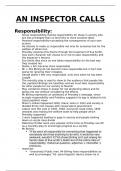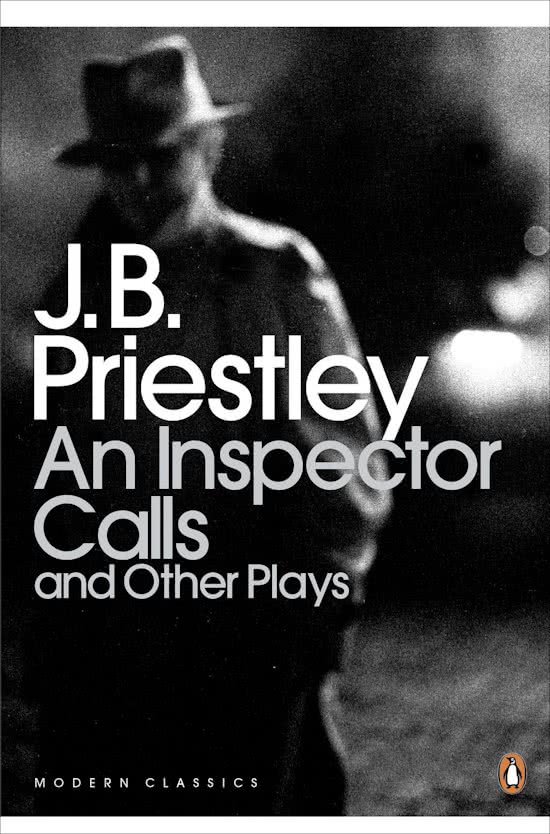AN INSPECTOR CALLS
Responsibility:
- Social responsibility=taking responsibility for those in society who
are less privileged than us and links to more socialist ideas
- Personal responsibility=accepting the consequences of your own
actions
- He intends to make us responsible not only for ourselves but for the
welfare of others too
- Priestley explores this theme through the treatment of Eva Smith,
how each character will choose to or not to take responsibility and
the Inspector’s lessons
- Eva Smith dies since no one takes responsibility for the bad way
they treated her
- Sheila + Eric become more responsible
- Mr + Mrs Birling do not become more responsible but in fact look
worse for ignoring their mistakes
- Gerald doesn’t feel very responsible, only tries when he has been
caught
- The morality play is used to show to the audience that people like
the capitalist Birlings are heartless and we must take responsibility
for other people for our society to flourish
- Play condemns those in power for not protecting others and for
going into war without considering the effects
- Mr Birling represents an antithesis of Priestley’s message, never
accepts responsibility and Priestley suggests his ego is related to his
class/capitalist views
- Miner’s strikes happened 1920, titanic sinks in 1912 and society is
divided firmly into classes with conservative government
- Labour won the vote in 1945, 1928- everyone could votes, 1945
onwards was making the welfare state to help people which
Priestley supported
- 2 wars happened leading to gaps in society and people looking
down on social class divide
- Detective thriller were very popular at the time so Priestley use dit
as a morality play to encourage progress as a society
- Mr Birling:
"If we were all responsible for everything that happened to
everybody we'd had anything to do with, it would be very
awkward, wouldn't it?"A1-shows Birling isn’t just wiping his
hands clean of Eva smith’s death but of the entire idea of
responsibility, rhetorical question, adjective + intensifier +
pronouns,
- Inspector:
“(massively) Public men, Mr Birling have responsibilities as
well as priveleges.”A2- para-linguistic device shows he is
, commanding, juxtaposition between responsibilities and
privileges ,refuting Mr Birling with his socialist ideas on
collective responsibility
“You see we have to share something. If there’s nothing else,
we’ll have to share our guilt.”A2-collective responsibility,
knows they have all done something wrong, foreshadows the
play ending, collective pronoun
“One Eva Smith has gone-but there are millions and millions
and millions of Eva Smiths and John Smiths…We don’t live
alone. We are members of one body. We are responsible for
each other…the time will soon come when, if men will not
learn that lesson, then they will be taught in fire and blood
and anguish.”A3- use of synecdoche for eva and john
representing working classes, inspector= Priestley’ socialist
mouthpiece, repetition, violent imagery implies war/hell,
syndetic list, inspector driving change into them
- Mrs B:
“I’ll tell you what I told her. Go and look for the father of the
child. It’s his responsibility.”A2- imperatives show commands,
no name shows disrespect, distancing pronoun, instruction
instead of help, not accepting responsibility, dramatic irony
- Gerald:
She didn’t blame me at all. I wish to God she had now.
Perhaps I’d feel better about it.”A2- distress in tone, didn’t
want the blame to be morally right but just to make himself
feel better, tries to make himself seem selfless for his
exploitation
“We’re respectable citizens and not criminals.”A1- highlights
his upper class upbringing, Priestley trying to highlight there
are moral crimes like how Gerald exploited Daisy not just
actual crimes, ironic
- Sheila:
"I know I'm to blame - and I'm desperately sorry - but I can't
believe - I won't believe - it's simply my fault that in the end
she - she committed suicide."A2- clearly taking responsibility,
adverbs show her guilt, first person pronouns, won’t take full
responsibility as she stands up for herself knowing others are
involved too
- Eric:
"I don't see much nonsense about it when a girl goes and kills
herself. You lot may be letting yourselves out nicely, but I
can't. Nor can mother.”A3- clearly shows extreme guilt, noun
nonsense shows how much he disagrees with Birling, sharing
responsibility with Mrs B
Gender:
- Priestley’s main message is that traditional gender roles hinder our
progression as a society and are damaging to women
- Different female characters in the play show different roles women
have in the patriarchal society





